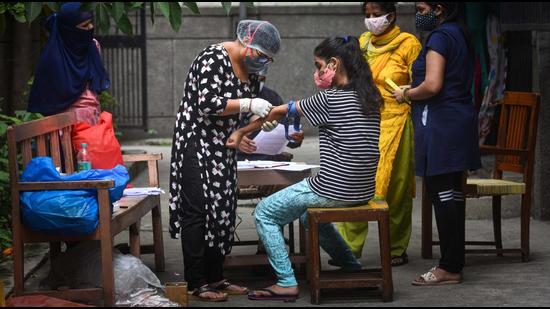Govt to get initial report of 7th Covid sero survey in Delhi on Monday
The preliminary results of the seventh round of the serological survey conducted in Delhi last month to estimate the population-level exposure to the Sars-CoV-2 virus (which causes Covid-19) are likely to be submitted to the state government on Monday, according to officials aware of the matter
The preliminary results of the seventh round of the serological survey conducted in Delhi last month to estimate the population-level exposure to the Sars-CoV-2 virus (which causes Covid-19) are likely to be submitted to the state government on Monday, according to officials aware of the matter.

“This round of the survey was conducted in great detail, so it will take some time to analyse the data. However, a preliminary report will be submitted on Monday. A more detailed report is likely to be submitted in early November, around Diwali,” said an official from Delhi’s health department who asked not to be named. Diwali this year will be celebrated on November 7.
The complete report will also contain information about vaccine eagerness or hesitancy, which was among the “extensive list of questions” for which data was collected digitally during the survey, said the official.
The government roped in three non-governmental organisations to help collect data during the survey.
Sero surveys are blood tests that check for antibodies to a virus. They are a good measure of the exposure of a population to the pathogen. They are also a proxy for the level of broad immunity that exists in the population, although the best immunity is that achieved through vaccination.
A portion of the samples collected will also be analysed for neutralising antibodies that specifically target the Sars-CoV-2 virus. This will help researchers correlate the level of IgG antibodies detected in semi-quantitative tests (which just show whether levels of an element are high or low) to the level of neutralising antibodies and thereby estimate the protection that a person has from the coronavirus disease.
This will be the Delhi government’s first complete survey after the brutal fourth wave of infections, which saw the city add over 28,000 infections at its peak.
The last round of the survey in Delhi in April was interrupted due to the emergence of the fourth wave. Just 13,000 samples were collected, instead of the 28,000 targetted. These samples, however, returned a reading of nearly 56%, which means 56 of every 100 residents of the Union territory were exposed to the virus. The previous five surveys returned readings of 56.13%, 25.5%, 25.1%, 29.1%, and 22.6% respectively.
However, a study from the All India Institute of Medical Sciences (AIIMS) that collected data at the peak of the second wave showed a seropositivity of 67% in Delhi. Further, a sero survey among staff members in the Council of Science and Industrial Research in Delhi showed a seroprevalence of 80% after the second wave. IgG antibodies, which the survey tests for, are developed around 10 to 14 days after the infection.
Stay updated with all top Cities including, Bengaluru, Delhi, Mumbai and more across India. Stay informed on the latest happenings in World News along with Delhi Election 2025 and Delhi Election Result 2025 Live, New Delhi Election Result Live, Kalkaji Election Result Live at Hindustan Times.
Stay updated with all top Cities including, Bengaluru, Delhi, Mumbai and more across India. Stay informed on the latest happenings in World News along with Delhi Election 2025 and Delhi Election Result 2025 Live, New Delhi Election Result Live, Kalkaji Election Result Live at Hindustan Times.





